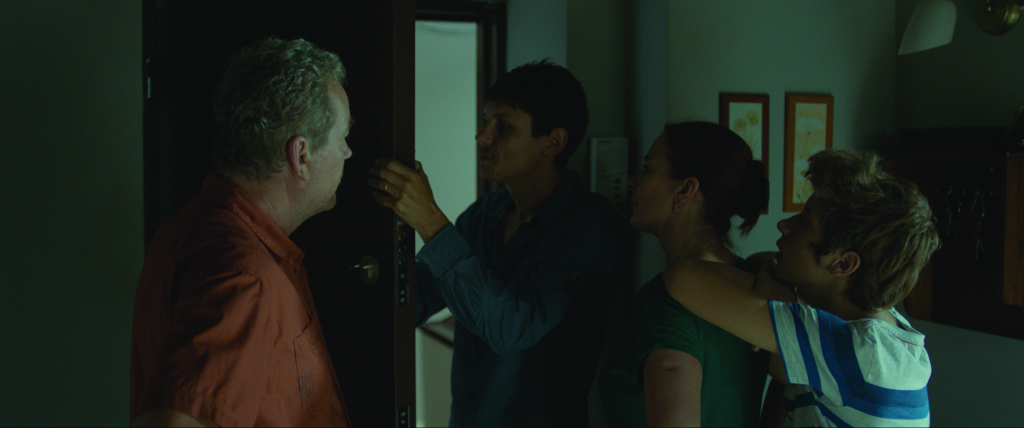One Floor Below
Director: Radu Muntean
Cast: Teodor Corban, Maria Popistasu, Iulian Postelnicu
Running time: 93 minutes
Country: Romania
___
If you’re familiar with Romanian (or Eastern European) cinema, then you’ll be well acquainted with its dark and melancholic tones. If you’re not, then you’re in for a cinematic surprise and there’s no better way for you to start this incursion than with director Radu Muntean’s highly acclaimed One Floor Below (“Un etaj mai jos”). It has all the makings of the Romanian New Wave Cinema, using a small and seemingly insignificant detail to give birth to an explosion of meaning. The main character, Patrascu (Teodor Corban) is a car-registration expeditor with a perfectly average life – a normal wife, a son who is as in love with gaming as his entire generation is, a Golden Retriever named Jerry, a regular circle of friends who enjoy Sunday night beer and football… Perhaps less normal is the fact that Patrascu is the indirect witness to a murder that takes place a floor below. As he returns from work one day, he hears Laura (Maria Popistasu) arguing with violent lover Vali (Iulian Postelnicu) and a day later, the girl is found dead. Patrascu tells no one of the argument he witnessed – why? That is left to you to interpret. Throughout the whole movie you follow Patrascu’s inner struggle – to turn in his neighbour, or to keep quiet and wait for it all to die down, especially given that Vali (who is now aware of Patrascu’s knowledge) begins to show up at his door, even interacting with Patrascu’s son more and more.
Unlike successes such as Child’s Pose (Calin Peter Netzerm, 2013) and The Death of Mr Lazarescu (Cristi Puiu), One Floor Below indeed stands out from its contemporaries due to the thin veil that Radu Munteanu casts between his characters and audience.
You know Vali is the murderer just as well as Patrascu does, but you only know this because you receive small clues in gestures and dialogue; the movie stubbornly refuses to betray its characters’ feelings up until its last frames. The camera does not so much serve as an extension of Patrascu’s point of view, as it merely follows him around and acts as a glimpse inside this man’s life, allowing the audience to pick out whatever they see as meaningful. What may or may not be subjective in this storytelling is unsure – the viewer is forced to be more active than usual in pulling apart the threads of “One Floor Below”, but that is what makes Romanian New Wave a hit with critics.
the viewer is forced to be more active than usual in pulling apart the threads of “One Floor Below”, but that is what makes Romanian New Wave a hit with critics
The post-communist bureaucratic society serves as a subtle backdrop and “invisible” character to the film. Conversations and many details remind you of the country’s history and culture: neighbours side with neighbours, family is valued above all and old communist blocks of flats are still being upgraded to fit the needs of modern day inhabitants. Patrascu is well loved by his customers and acquaintances, an all-around “good” man, but perhaps one of the questions that the movie poses is what really classifies a man as good and to what extent is why Patrascu has to have this internal debate in the first place – is it his own ethics or his society’s?
One Floor Below is far from a “crowd-pleaser”: it doesn’t have explosions, it doesn’t leave you feeling all warm and fuzzy (if anything, it has a haunting atmosphere, typical of Romanian cinema), it’s not obvious and the script isn’t filtered so as to lead you directly to what you need to know. Instead, the viewer is hauntingly left to choose what he feels is relevant out of the dialogue and plot in a situation where you are extremely aware of a constantly bubbling tension. Recently praised by both Variety and Hollywood Reporter and featured in the Cannes ‘Un Certain Regard’ selection, it’s an experience for any film lover and the kind of movie you either love or hate, but which stays with you for a long time after you’ve seen it.


Comments (1)